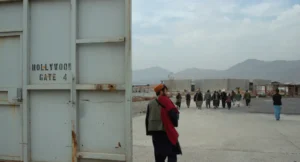Does Hagel’s Departure Pave the Way for Combat Troops to Iraq?
It's a surprise to see President Obama actually fire someone. But I have to worry that Defense Secretary Chuck Hagel's forced departure may signal further expansion of U.S. military involvement in Iraq and Syria. Secretary of Defense Chuck Hagel waves goodbye. U.S. Air Force/Master Sgt. Adrian Cadiz
Secretary of Defense Chuck Hagel waves goodbye. U.S. Air Force/Master Sgt. Adrian Cadiz
It’s a surprise to see President Obama actually fire someone. But I have to worry that Defense Secretary Chuck Hagel’s forced departure may signal further expansion of U.S. military involvement in Iraq and Syria.
Obama hardly ever gives anybody the boot, often sticking with aides and appointees long past their sell-by dates. Obama said Monday that Hagel “came to me” to discuss a possible departure, but multiple news reports quoted senior officials as saying he was forced out. Coming after last week’s in-your-face executive action on immigration, the move seemed to suggest that Obama’s patience, at this point in his tenure, no longer rivals that of Job.
That’s all to the good. Obama will accomplish more in his last two years if he is seen as taking the initiative rather than reacting to events — and if he has the right team in place.
From the start, Hagel seemed kind of wrong. He stumbled and fumbled through his confirmation hearings, despite the fact that he was among old friends: He had served two terms in the Senate. In the end, he won the votes of just four fellow Republicans.
Hagel’s chief recommendation for the job was his skepticism about George W. Bush’s war in Iraq. As early as 2005, Hagel was comparing Iraq to Vietnam — where he had served in combat as an enlisted man. In 2006, he wrote in The Washington Post that “there will be no victory or defeat for the United States in Iraq” and called for beginning a withdrawal of U.S. troops.
Was he equally skeptical about Barack Obama’s war in Iraq and Syria? Not if you judge by his public statements. Before Obama had even decided on his air-war strategy — which has already morphed into air-war-plus — Hagel said the Islamic State was “beyond anything that we’ve seen” and an “imminent threat to every interest we have.” The White House was not thrilled at the hyperbole.
If that was really Hagel’s view, however, at the Pentagon he did little to act on it. Unlike other recent wartime defense secretaries — Donald Rumsfeld leaps to mind — Hagel showed little interest in trying to micromanage strategy and tactics. He left that to the professionals — led by Joint Chiefs Chairman Martin Dempsey — and the White House, which is no stranger to micromanagement.
Hagel’s original task, as defined by Obama, was to oversee the withdrawal of combat forces from Afghanistan and manage a rational shrinking of the Pentagon budget. That changed with the rise of the Islamic State and Obama’s decision to launch a new war.
Obama has already doubled his initial troop commitment to 3,000. U.S. and allied airstrikes have slowed, and in some places halted, Islamic State advances — at least in Iraq. But the terrorist militia continues to hold a vast swath of territory in Iraq and Syria, and military experts are virtually unanimous in saying that airstrikes alone cannot carry out Obama’s pledge to “degrade and ultimately destroy” the group and its purported “caliphate.”
Other elements of the president’s plan are not panning out. The Shiite-dominated Iraqi government has not reached out to Sunni tribal leaders and convinced them to turn their backs on the Islamic State. The Iraqi army has not magically been transformed into an effective fighting force. The “moderate” Syrian rebels who are supposed to serve as allied ground troops have not been trained or equipped; mostly they have been getting smashed between the Islamic State’s hammer and Syrian dictator Bashar al-Assad’s anvil.
Hagel’s public statements may have been all over the map, but he has a demonstrated aversion to deploying U.S. combat troops without a clear mission or a clear path to victory. I accept that probably he was not the right person for the job. But it is essential, in my view, that his replacement have similar caution.
It is hard to imagine that the current strategy can possibly work. It is hard to see how the United States avoids becoming mired not just in Iraq’s sectarian struggles but in Syria’s apocalyptic civil war. Dempsey and other military officials have already mused that if this plan fails, a new plan might require more troops.
I hope Hagel’s departure is more about rectifying a bad fit than about a fundamental shift in the nature of the job. I hope the president keeps this truth in mind: It’s easier to crank up a war than wind it down.
Eugene Robinson’s e-mail address is eugenerobinson(at)washpost.com.
© 2014, Washington Post Writers Group
Your support is crucial…With an uncertain future and a new administration casting doubt on press freedoms, the danger is clear: The truth is at risk.
Now is the time to give. Your tax-deductible support allows us to dig deeper, delivering fearless investigative reporting and analysis that exposes what’s really happening — without compromise.
Stand with our courageous journalists. Donate today to protect a free press, uphold democracy and unearth untold stories.









You need to be a supporter to comment.
There are currently no responses to this article.
Be the first to respond.